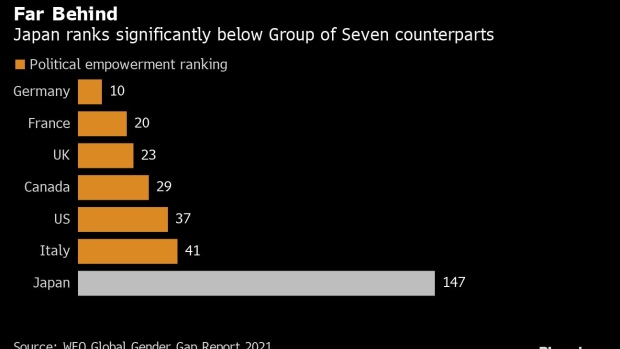Jun 27, 2022
One Female Candidate’s Run Shows Lagging Diversity in Japan
, Bloomberg News

(Bloomberg) -- Thirty-three, female and of Uyghur descent, one candidate in Japan’s parliamentary elections is seeking to break down the barriers to the “old boys’ club” of the nation’s politics.
Arfiya Eri said it’s time for Japan to embrace the changes unfolding around it and she’s making her bid as the youngest candidate in the July 10 upper house election backed by the Liberal Democratic Party -- the long-ruling conservative group that critics say has dragged its feet in advancing the rights of women.
“Japan already is a diverse country, it’s just we’re not seeing that represented in politics,” said Eri, speaking in an interview with Bloomberg TV Monday. “It’s something that I’d like to bring forward with my own candidacy as well.”
In one of the world’s most homogeneous countries, Eri -- who speaks seven languages -- stands out. If she wins, she’d join a tiny number of naturalized Japanese lawmakers and probably be 20 years younger than most members.
Born in Fukuoka, southern Japan, with Uyghur heritage on her father’s side and Uzbek heritage on her mother’s, Eri gained Japanese nationality as a child. She moved to Shanghai at the age of 10 for her father’s work and, after attending American schools in China, graduated from Georgetown University in Washington and its graduate school.
That upbringing and academic background helped shaped her world view, especially when it comes to China, which has been accused by the US of genocide of its Uyghur minority. China has consistently denied allegations that it oppresses the majority Muslim Uyghurs, dubbing such claims “the lie of the century.”
“I’ve seen an undemocratic world, and I’ve experienced it in a very significant way,” said Eri. “I understand deeply at my core what happens when we give up our democracy, when we don’t protect our democracy.”
Prime Minister Fumio Kishida and his LDP have pushed back against a more assertive China, while treading delicately with a country that’s Japan’s largest trading partner. Spooked by Russia’s attack on Ukraine, the once-dovish Kishida has promised a substantial increase in military spending from a customary limit of about 1% of gross domestic product, a break with tradition for a nation with a pacifist constitution.
Despite such noticeable changes on the international front, at home LDP governments have made little progress in narrowing a political empowerment gender gap that ranked 147 out of 155 countries in the latest rankings from the World Economic Forum.
While the percentage of female candidates entering the upcoming vote is the highest on record at about 30%, the LDP had one of the lowest percentage of female candidates among the parties at 23%, according to the Tokyo Shimbun newspaper. About half the candidates for the largest opposition group, the Constitutional Democratic Party, are women.
“We believe that by getting female candidates to win, Japanese politics will really change,” the group’s Secretary General Chinami Nishimura said at a news conference this month.
The difficulties women face in reaching the top in the LDP partly reflects their scarcity at all party levels. Only 10% of the total members of the Diet’s powerful lower house are women, with the LDP at 8%. Japan ranks 162nd among the 193 countries surveyed by the Inter-Parliamentary Union in terms of gender balance -- below Bahrain and Saudi Arabia.
“We are still an old boys’ club,” said Eri. “But we recognize that it’s an old boys’ club. That’s a start.”
Eri, who has also worked at the Bank of Japan, says she decided to run for the LDP because she believes the ruling party is the only one equipped to protect national security and govern Japan through multiple crises including Covid-19.
As a candidate for the national, proportional representation segment of the election, Eri is vying for votes from across the country. Her rivals include former ministers and those with industry backing, but her fate will depend on how many votes both the ruling party and she personally wins. Recent national elections have tended to show historically low voter turnout.
About 36% of respondents to a Yomiuri newspaper poll published last week said they intend to vote for the LDP, which has relied on a base of older voters in rural constituencies, in the proportional representation section, with all other parties at 10% or lower.
“We need better representation -- we need young people to feel that they are being represented, that the future is in their hands,” said Eri. “Right now, a lot of antagonism comes from the fact that most of the politicians look the same to them.”
If elected, Eri says she’ll push for a stronger stance on democratic principles, and national security. An urgent approach to climate change is another area she’ll advocate for, as well as diversity.
“It’s really bringing Japan forward,” said Eri. “By that I mean a quantum leap in making sure that we become a country that is suited for the 21st century and accommodates to the diversity that we already have.”
©2022 Bloomberg L.P.






